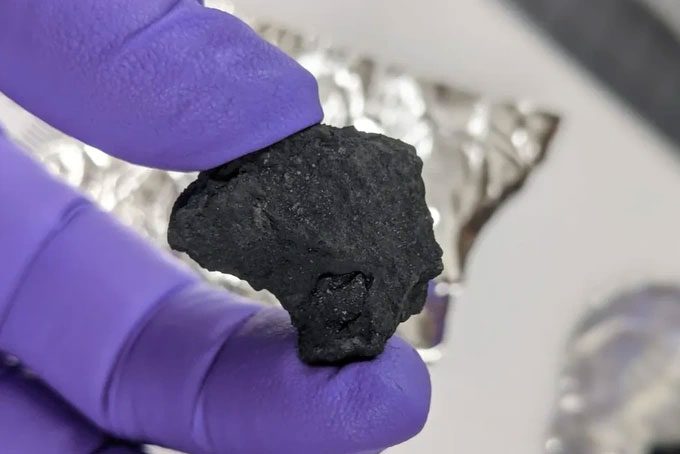By analyzing the Winchcombe meteorite that fell in the UK, scientists have discovered the origins of organic matter, including protein blocks.
On February 28, 2021, a fireball streaked across the sky of the United Kingdom, leaving behind rare meteorite fragments that landed near the town of Winchcombe, Gloucestershire.
This meteorite is known to be the first to fall in the UK in over 30 years, and the hunt for its debris began immediately.
Meteorite Bringing Water to Earth
In a recent study published, scientists assert that the Winchcombe meteorite is one of the rarest types ever to fall to Earth.

A fragment of the Winchcombe meteorite. (Photo: Natural History Museum).
Analyzing the composition of the meteorite, a group of researchers from the Natural History Museum, University College London, and the University of Glasgow found that the meteorite contains about 10% of its weight in water, and its composition closely resembles that of water on Earth.
This raises the hypothesis that this type of meteorite – known as a carbon chondrite – likely played a significant role in bringing water to our ancient planet.
“Carbon chondrites are highly reactive and decompose quickly in Earth’s atmosphere, altering the original mineral composition,” the researchers stated.
“However, in the case of the Winchcombe meteorite, it did not have enough time to react with the Earth’s environment. Therefore, everything inside it is completely 100% from outside.” the research team emphasized.
Not Just Water, But Possibly Life
In addition to containing water, the meteorite sample also carries important carbon- and nitrogen-based molecules. Among them are amino acids – the building blocks of proteins.
These, along with water, are believed to have played a crucial role in the evolution of life on Earth, scientists assert.
“Life as we know it requires two essential components to have a chance of emerging: water and organic molecules like amino acids – the Winchcombe meteorite has both,” Dr. Luke Daly, a representative of the research team from the University of Glasgow, shared.
“Such meteorites could serve as everything a developing planet needs if it aspires to develop life.”
The rapid recovery and analysis of the Winchcombe meteorite have made it one of the most pristine meteorites known to date, offering scientists a glimpse into the original composition of the Solar System 4.6 billion years ago.
According to the research team, samples of this extraordinary meteorite will be publicly displayed at several locations, including the Natural History Museum in London.


















































